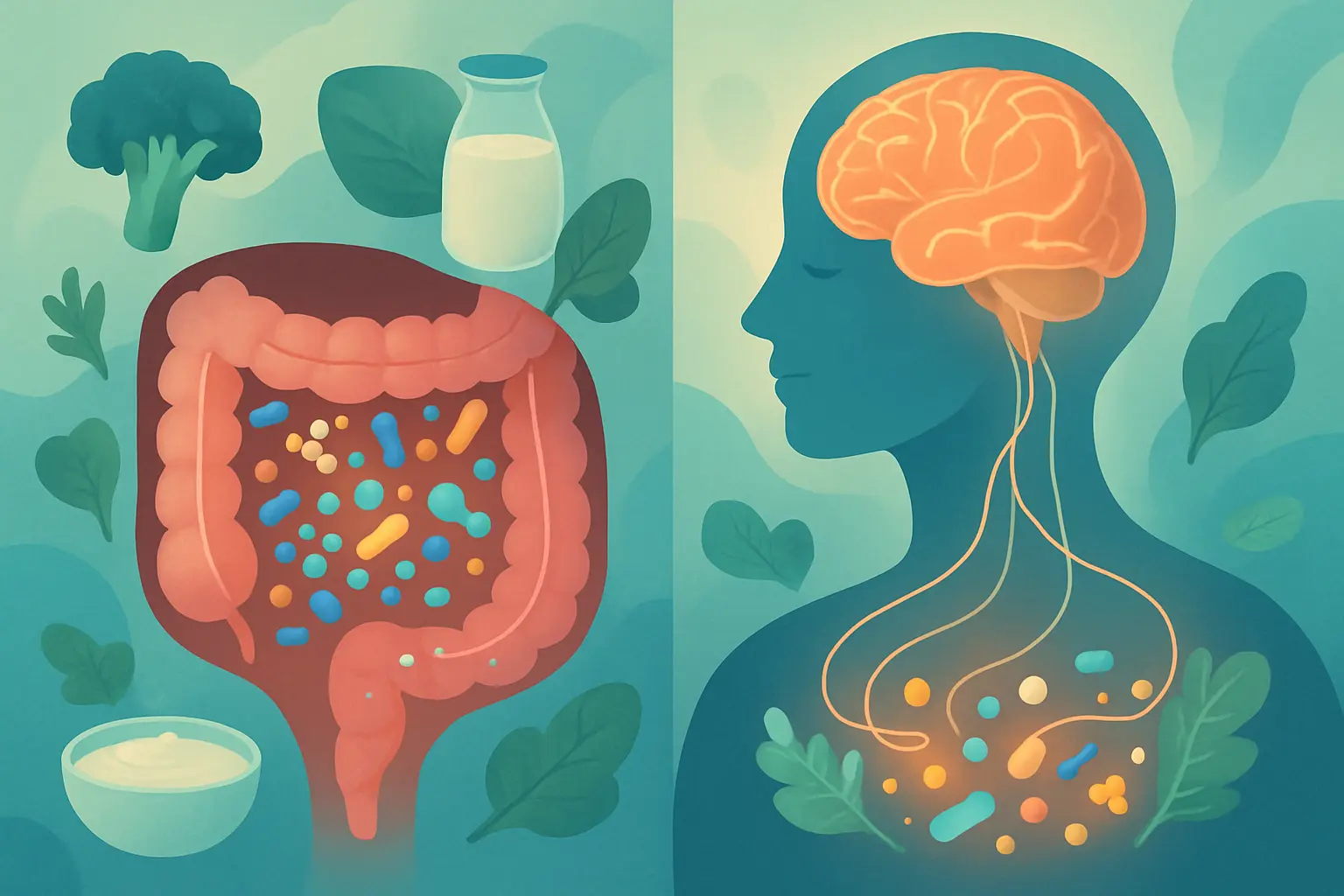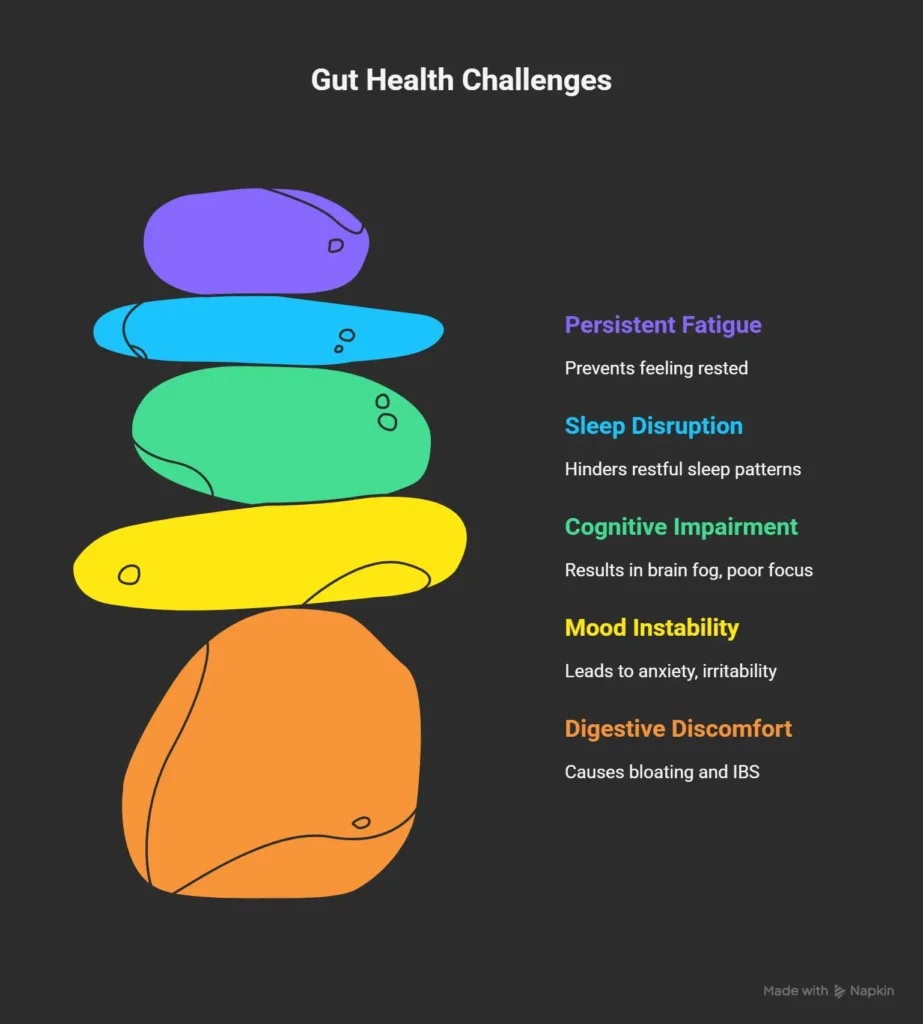How to Improve Mental Health Through Gut Health

Did you know your gut is often called your “second brain”? That’s because the trillions of bacteria in your gut don’t just help you digest food—they also produce key neurotransmitters like serotonin and dopamine, which directly affect your mood, stress response, and mental clarity. When your gut is out of balance, it can take your mind down with it. The good news? By improving your gut health, you can support your mental health in simple, powerful ways.
In this post, we’ll break down how the gut-brain connection works, the signs your gut may be impacting your mood, and practical steps to restore balance.
The Gut-Brain Connection Made Simple
Your gut and brain are constantly communicating through what’s called the gut-brain axis—a two-way highway of nerves, hormones, and immune signals. In fact, over 90% of serotonin (your “feel-good” chemical) is produced in the gut, not the brain (Nuvance Health).
When your gut microbiome is diverse and balanced, it supports better mood regulation, focus, and resilience to stress. But when it’s disrupted—by poor diet, stress, lack of sleep, or antibiotics—it can trigger inflammation and imbalance, leading to anxiety, depression, or brain fog.
Signs Your Gut May Be Affecting Your Mental Health
If your gut is out of balance, your mental health may feel it too. Common signs include:
- Frequent bloating, IBS, or digestive discomfort
- Low mood, anxiety, or irritability
- Brain fog and poor focus
- Trouble sleeping or feeling rested
- Fatigue that doesn’t improve with rest

If these sound familiar, your gut-brain connection may need some attention (Harvard Health).
How to Improve Gut Health for Better Mental Health
1. Eat More Gut-Friendly Foods
Your microbiome thrives on fiber-rich and fermented foods. Fill your plate with:
- Fiber: fruits, vegetables, beans, and whole grains feed good bacteria.
- Fermented foods: yogurt, kefir, sauerkraut, kimchi, miso—natural sources of probiotics. Studies suggest that fermented foods may reduce stress hormones and improve mood (Food & Wine; The Times).
- Prebiotic foods: garlic, onions, bananas, asparagus—these act as “fertilizer” for probiotics.
2. Use Probiotics Wisely
Probiotics are beneficial bacteria that can support both digestion and mood. Certain strains—like Lactobacillus and Bifidobacterium—are linked to reduced anxiety and better resilience to stress (NIH Review). You can get them from fermented foods or high-quality supplements. The key is consistency—daily intake matters more than a one-time boost.
3. Limit Foods That Harm the Gut
Just as some foods heal, others harm. Try to cut back on:
- Processed sugar and refined carbs (they feed “bad” bacteria).
- Artificial sweeteners (some disrupt the microbiome).
- Excess alcohol and heavily processed foods.
Reducing these can lower gut inflammation and support a healthier gut-brain axis (EatingWell).
4. Support the Gut-Brain Axis with Lifestyle Habits
Food isn’t the only piece of the puzzle. Your lifestyle plays a huge role in gut health:
- Manage stress: deep breathing, meditation, or yoga calm the nervous system and ease digestion.
- Prioritize sleep: your gut repairs itself overnight, so aim for 7–9 hours.
- Stay active: regular exercise increases microbiome diversity and reduces stress. Even something as simple as a short post-meal walk can improve digestion and mood.
A Simple Daily Routine for Gut-Brain Balance
Here’s how a gut-brain friendly day might look:
- Morning: Start with water + probiotic-rich yogurt topped with berries and oats.
- Midday: A fiber-packed salad with beans, leafy greens, and a fermented dressing (like apple cider vinegar).
- Evening: A light, balanced meal—grilled fish or lentils with vegetables, plus a calming tea (chamomile or peppermint).
- Throughout the day: Short walks, deep breathing breaks, and limited processed snacks.
Small, consistent steps like these can gradually reset your gut—and in turn, your mental health.
When to Seek Professional Help
If symptoms of anxiety, depression, or digestive issues persist, don’t go it alone. A healthcare provider or registered nutritionist can run tests, recommend targeted probiotics, or combine gut health strategies with therapy or medical guidance (Cleveland Clinic).
Conclusion
Your gut and brain are in constant conversation. When your gut microbiome is healthy, your mind is clearer, your mood steadier, and your stress easier to handle. By adding gut-friendly foods, using probiotics, cutting back on harmful ingredients, and supporting your lifestyle habits, you’re not just helping your digestion—you’re building a stronger, more resilient mind.
Takeaway: Heal your gut, and your mind will thank you. What’s one small change you can make today to nourish both?
FAQs
A1: Your gut and brain are connected through the gut-brain axis. A healthy gut microbiome supports mood, focus, and stress resilience by influencing neurotransmitters like serotonin.
A2: Foods high in fiber, fermented foods like yogurt, sauerkraut, and kimchi, plus prebiotics like garlic, onions, and bananas all help balance gut bacteria and support mental well-being.
A3: Yes. Certain probiotics, especially strains like Lactobacillus and Bifidobacterium, may reduce stress and anxiety by improving gut health and lowering inflammation.
A4: Stress management, quality sleep, daily movement, and cutting down on processed foods all help strengthen the gut-brain connection and boost mental health.
A5: If you experience ongoing digestive problems, anxiety, or depression despite lifestyle changes, it’s best to consult a healthcare professional for guidance.
